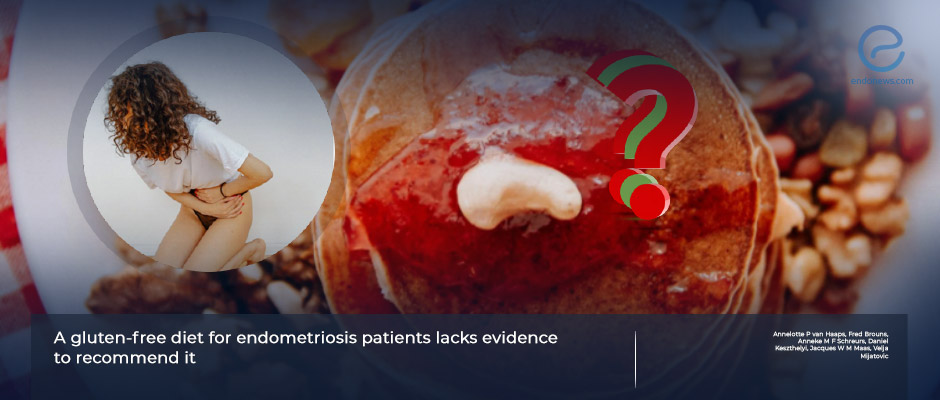Gluten-free diet fot endometriosis-associated gastrointestinal symptoms
Oct 16, 2024
Gluten-free diet have limited effectiveness for management of endometriosis: lack of scientific evidence
Key Points
Highlights:
- The women’s lives may be affected negatively on different aspects including social, physical and psychological health due to endometriosis-associated gastrointestinal symptoms.
Importance:
- Patients with endometriosis should be informed about the general healthy eating recommendations including the avoidance of trans-fatty acids and limited alcohol, meat and salt consumption to increase the quality of life.
What’s done here?
- The effectiveness of gluten-free diet on gatsrointestinal symptoms in endometriosis patients was evaluated in this analysis article.
- It was also emphasized why gluten-free nutrition should not be used to reduce gastrointestinal complaints in women with endometriosis.
Key results:
- Gluten is a structural protein naturally found in certain cereal grains,mostly well-digested by the human body.
- Certain proline-rich peptides which are part of gluten may trigger hypersensitivities.
- Studies assessing the gluten-free diet as a tool to diminish gastrointestinal symptoms in endometriosis patients revealed several limitations.
- In addition, gluten-free diet may adversly affect the gastrointestinal microbiome without proper dietary guidance.
- Dietary restrictions throughout life may cause diminished quality of life.
- The likelihood of obesity, increased body mass index, impairment of glucose and lipid metabolisms and development of metabolic syndrome may be observed more frequently due to gluten-free diet.
- The risk of diabetes mellitus type II, cardiovascular disease, hypertension and certain types of cancer is observed as higher because of increased body mass index.
- The low-FODMAP diet and the so-called endometriosis diet may show promise for symptom relief and improved quality of life, but more research is needed.
Lay Summary
Women with endometriosis often report gastrointestinal symptoms such as bloating, constipation, diarrhea, and abdominal cramping,may have a negative impact on women’s lives having endometriosis and which can mimic irritable bowel syndrome (IBS) leading to potential misdiagnosis. A commonly suggested dietary intervention is a gluten-free diet, often promoted on social media. While effective for conditions like non-celiac wheat sensitivity or celiac disease, its impact on endometriosis remains uncertain.
vanHaap et al., from The Netherlands, published a study titled as “A gluten-free diet for endometriosis patients lacks evidence to recommend it” in the journal named as American Journal of Obstetrics and Gynaecology Global Reports. These authors reviewed the literature to determine whether there is any beneficial effect of gluten-free diet on endometriosis-associated gastrointestinal symptoms. According to these studies, dietary restrictions throughout life may also cause diminished quality of life. The likelihood of obesity, increased body mass index, impairment of glucose and lipid metabolisms and development of metabolic syndrome may be observed more frequently due to gluten-free diet. In addition, gluten-free diet is expensive and the gastrointestinal microbiome may be adversely affected without proper dietary guidance. Additionally, a gluten-free diet may lead to reduced fiber intake, diminishing the diversity of beneficial gut microbiota. If not properly balanced with healthy alternatives, this diet could raise the risk of obesity, negatively affect metabolic health, and potentially influence endometriosis severity. On the other hand, there are several limitations in these studies such as absence of control group, ignoring the placebo and nocebo effects of gluten-free diet.
To date, studies assessing the gluten-free diet's effects on endometriosis symptoms are lacking, and adherence to this diet for managing endometriosis is not recommended. Instead, a focus on general healthy eating practices, such as avoiding trans fats and limiting alcohol, meat, and salt, is advised. The low-FODMAP diet and the so-called endometriosis diet may show promise for symptom relief and improved quality of life, but more research is needed. It's essential to consider placebo and nocebo effects when evaluating dietary interventions.
“Scientifically substantiated advice regarding the use of a gluten-free diet for endometriosis-related symptoms is currently not available, and a gluten-free diet should be discouraged unless there is an additional diagnosis of nonceliac wheat sensitivity or celiac disease.” the authors added.
Research Source: https://pubmed.ncbi.nlm.nih.gov/39040659/
endometriosis dietary intervention endometriosis diet fiber deficiency gastrointestinal symptom gluten-free diet high cost insufficient evidence irritable bowel syndrome low fermentable oligosaccharides disaccharides monosaccharides and polyols diet self-management social isolation quality of life

